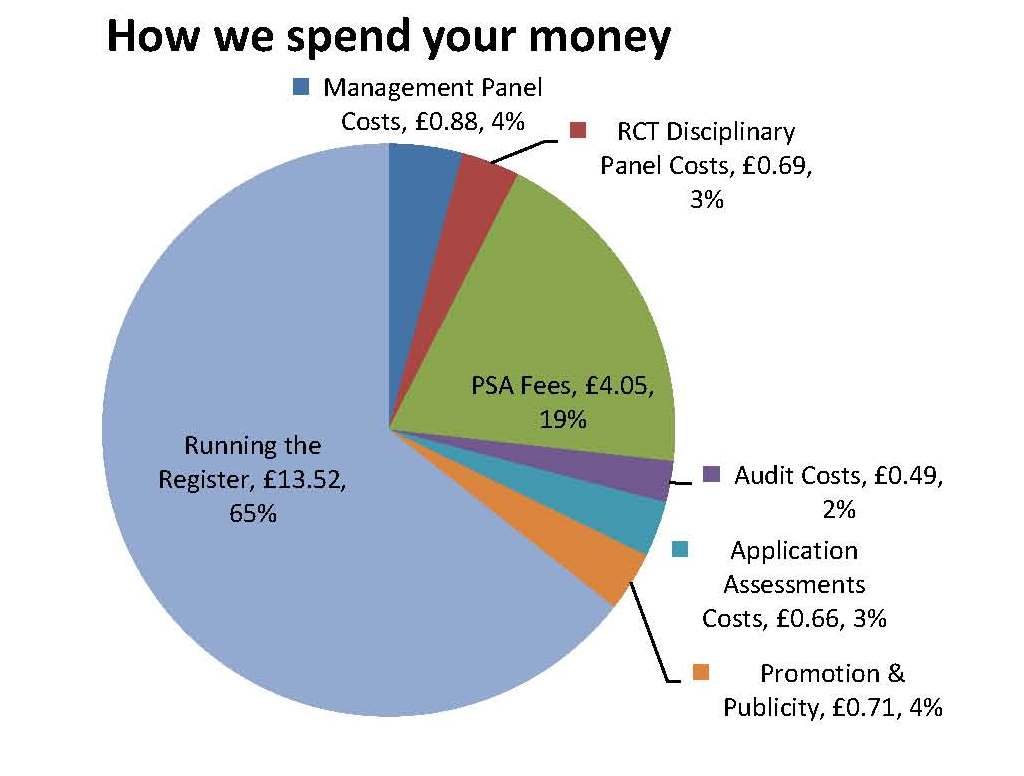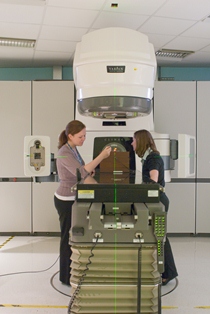Since becoming the RCT registrar I am often asked the question “What do I get from the RCT for my registration fee?”
The simple answer to this is that the RCT is a register, not a professional body so there are no member benefits such as those which come with IPEM, IHEEM or ART membership.
For some professions, being on a statutory register such as the General Medical Council or the Nursing and Midwifery Council are a legal requirement in order to be able to work. The RCT is of course voluntary, but by being on the register it demonstrates that you are committed to maintaining professional standards and protecting the public. Also many employers do ask that their staff are on the RCT as one of their conditions of employment.
I am of course aware that this only goes part way to answering the question “What do I get from the RCT for my registration fee?” So I thought we should show all registrants some transparency and explain how your £21 will be spent in 2018. It is worth noting that IPEM supported the RCT financially for many years, however it is an important part of the Professional Standards Authority (PSA) accreditation that the Register demonstrates that it can be self-sustaining, so we can no longer reply on IPEM to do this.
This diagram demonstrates how the £21 is divided between the financial commitments of the register.
The largest part of the fee is of course the £13.52 each registrant contributes to the running of the register. This includes such costs as office overheads and the website and online register. However the largest percentage of this is for staff time, which is provided by IPEM but funded by the RCT.
It was not until I became involved with the RCT management panel that I saw how much time and effort the hard working IPEM staff contribute to us. There are roles which are essential such as writing and updating our policies and procedures and also getting us through the annual PSA accreditation. They also have hours and hours of work each year processing renewals and the CPD audit. If registrants were more proactive in returning the CPD reports or were to switch to direct debit payments, this would certainly make the register more efficient.
Moving round the chart, the next segment is the £0.88 spent on management panel costs. The management panel consists of 12 people who meet 3 times per year at the IPEM national office in York to manage the Register. These costs are to cover members’ travelling expenses but the room is provided free by IPEM. In addition, a small amount is set aside in case management panel members need to travel to attend other meetings such as the annual conference held by the Professional Standards Authority who accredit the Register.
RCT disciplinary panel costs are £0.69 per registrant. All members of the Professional Conduct Committee of the RCT undergo annual training for their role which is held at the IPEM national office; again a room, and the training itself, is provided free by IPEM. In addition, a small amount is set aside in case disciplinary panel members need to travel to attend hearings.
PSA Fees are the second largest spend at £4.05. This is the cost of annual accreditation by the Professional Standards Authority.
Audit costs – the annual CPD audit involves assessors attending the IPEM national office to assess the CPD summary forms of registrants selected for audit. The costs relate to those assessors travelling to the CPD audit day held for 2 days in May at the IPEM national office in York; a room is provided free by IPEM. The cost of the annual CPD audit is £0.49 each however a lot of the background work prior to this is carried out by the IPEM office staff and is captured in the running the register percentage.
Application assessments costs at £0.66 include the training of all RCT application assessors for their role. This takes place annually at the IPEM office where again the room is provided free of charge.
Finally promotion and publicity cost each registrant £0.71 a year. This covers the print and design of brochures, leaflets and posters to promote the Register and to educate the public about the RCT’s accredited register as well as about the work done by Clinical Technologists. In addition, the cost of the certificates sent to new registrants once they have been successful in their application to the Register.
I hope this explains how your annual fees are spent and when these are compared to other voluntary registers it shows the RCT is run very effectively and m anages to keep its fees as low as possible.
anages to keep its fees as low as possible.
Yours sincerely
Mr Iain Threlkeld
The RCT Registrar



